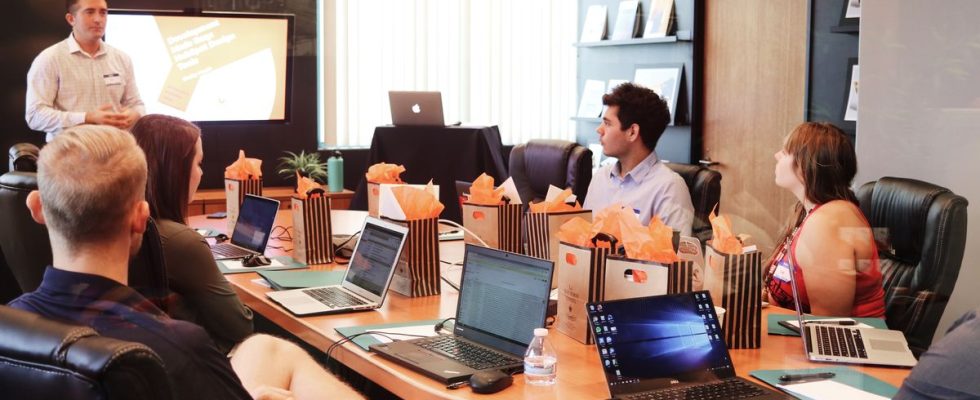“It’s everyone’s choice. Every LGBT+ has the right to say it or not,” says Eric Barbier at the age of 59. In thirty years, in the same company, he was able to observe at the heart of the machine, the evolution of the place of LGBT+ in the world of work. If today, 71% of French people consider that the company must do everything to promote the inclusion of LGBT+ in their professional world compared to 66% in 2022 according to a survey conducted by Ipsos with 1,000 French workers forOther Circle*, the fight goes on.
“After the personal coming out, there is the one at work. No one is obliged to do this, but we must be able to feel safe and calm in our work. It’s not propaganda but just being yourself in the company in the same way as your colleagues,” explains the former management controller in a large telephone group in Occitania.
The latter has gradually adapted to society. Thirty years ago, he did not feel like making his homosexuality official. With the arrival of PACS (1999) and Marriage for All (2013), things became simpler. “Little by little it happened naturally. A few years ago during a job interview, I ended up saying it clearly and it happened without any problem,” adds the former pre-retirement employee. Yet inclusion is not always the norm. “We still have quite a few hidden LGBT+ people who don’t dare to be visible at work. This has a direct impact on their work. When you spend time at work hiding, it takes energy from you and inevitably handicaps you. This is the benefit of having role models to normalize these issues,” adds Nicolas Roudergues, co-president of L’Autre Cercle Occitanie-Pyrénées, the leading French association for the inclusion of LGBT+ people at work.
“I really saw the generation difference”
And for those who take responsibility? “They made comments because they were surprised that I was so comfortable saying that I was a lesbian… I didn’t have any comments that were mean or that I would characterize as homophobic but they were rubbish after work. It was disturbing. I really saw the generation difference. If I’m gay, it’s my life, I don’t ask anyone to comment on it,” asserts Léa*, 26, who subsequently left her communications box, feeling uncomfortable with her colleagues.
“In small businesses, we are still lagging behind on these issues,” comments the representative of the Other Circle. “Lesbians exacerbate fantasies among certain LBGTphobes and older generations. What’s more, they are women… They basically suffer more harassment. We must no longer let this pass,” adds Eric Barbier. He was able to analyze in which teams he could be comfortable or not. “As a man, I also quickly put an end to these disturbing thoughts. »
Furthermore, according to the Ipsos survey, 70% of French people say they are in favor of setting up a warning system in the event of discrimination or harassment, and 62% are in favor of sanctions in the event of LGBTphobia and awareness campaign aimed at employees. Only a third of workers (35%) have actually noted the implementation of a discrimination or harassment alert system, and less than three in ten can confirm the existence of sanctions.
Feel confident at your work
The goal, ultimately, of this inclusion is to allow everyone, whether homosexual, lesbian, bi, or even trans, to be able to assume, if they wish, their private life and to be themselves in a place where he spends most of his time. Over coffee while talking about their weekend, during gossip in the canteen and even about mutual insurance registrations. “It’s simply important to be comfortable in a group,” adds Eric Barbier. “Above all, the choice of sexuality or gender has no impact on the employee’s quality of work,” explains Nicolas Roudergues.
Gender, in fact, is a fundamental question in the inclusion of LGBT+ people in business. “In transition, the employee, if he wants to be supported by his company and remain in his position, must be forced to come out unlike homosexuals and lesbians. He can’t hide like others do. It is important that hierarchy, HR and managers are trained in all of this. This is the interest of L’Autre Cercle,” adds the fifty-year-old.
Currently, no training is given during the HR course, as demonstrated by Morgane Iturria, a master’s student in Toulouse. “The question is not addressed… Only on the inclusion of people with disabilities.” This is when L’Autre Cercle intervenes directly in companies: to teach them and make them understand.
LGBTfriendly companies concerned about their image?
If this subject has become a priority or important for six out of ten workers, only a third of respondents think that their company has become LGBTfriendly over the last five years. And almost two thirds (62%) believe that the companies involved act mainly for the sake of reputation.
“We see that more and more large companies concerned about their reputation are working on these issues. In small structures this is less often the case. It’s like for the environment, it’s the way for them to retain talent and above all to do business,” explains the co-president of L’Autre Cercle Occitanie-Pyrénées. Questionable motivations, but which allow the LGBT+ cause to move forward.
* Study on the inclusion of LGBT+ people at work and the importance for organizations of having role models
*The first name has been changed.

